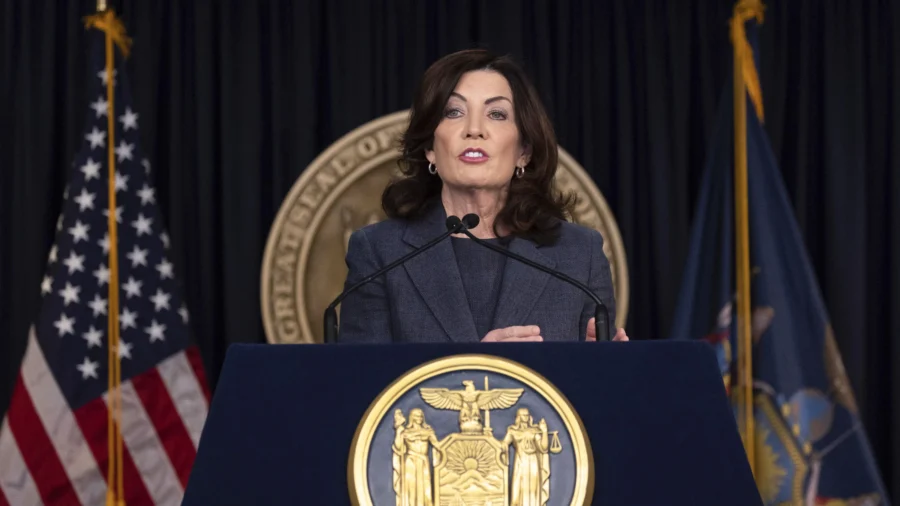The state of New York will charge carbon-emitting companies an estimated $75 billion in climate damage they allegedly caused between 2000 and 2018 under a law enacted on Dec. 26.
Gov. Kathy Hochul signed the Climate Change Superfund Act into law on Thursday. It is certain to be challenged in court as a state preemption of federal regulatory oversight.
Adopted by lawmakers in June, the law—which goes into effect in 2028—will annually assess large companies’ carbon emissions across those first 19 years of the 21st century to “repair damage caused by extreme weather” they said aggravated by greenhouse gas emissions.
“New York has fired a shot that will be heard round the world: the companies most responsible for the climate crisis will be held accountable,” said Democratic state Sen. Liz Krueger, a lead sponsor of the New York Climate Change Superfund Act.
The bill estimates compliance will cost about three dozen of the state’s largest carbon-emitting companies about $3 billion collectively each year for the next 25 years—$75 billion in total. That would be 15 percent of the $500 billion the Fiscal Policy Institute estimates the law could actually end up costing by 2050.
“With nearly every record rainfall, heat wave, and coastal storm, New Yorkers are increasingly burdened with billions of dollars in health, safety, and environmental consequences due to polluters that have historically harmed our environment,” Hochul said in a Dec. 26 statement released by her office, noting that $500 billion equates to “more than $65,000 per household.”
The money will go into a Climate Change Adaptation Cost Recovery Program to restore and protect coastal wetlands, and upgrade roads, bridges, and stormwater systems, among other infrastructure resiliency projects and programs.
New York’s law is modeled after the 1980 federal Comprehensive Environmental Response, Compensation, and Liability Act (CERCLA), or Superfund law, which requires companies responsible for pollution to pay for cleanup and remediation of polluted land, water, and air.
New York is the second state to adopt a “polluter pays” liability law. Vermont lawmakers earlier in 2024 adopted its law that was enacted July 1 without Republican Gov. Phil Scott’s signature.
It requires the state treasurer to calculate damages from “climate change-caused disasters,” as well as the expenses the state is incurring to adapt to changing conditions such as increasing precipitation in assessing carbon emitters.
Once those calculations are tabulated, Vermont will assess companies responsible for more than 1 billion metric tons of greenhouse gas emissions over the past 30 years, levied as a “proportional to its share of global emissions.”
New Jersey lawmakers, in recess from an underway 2024–2025 session, are likely to adopt in early 2025 Senate Bill 3545, the Climate Superfund Act, which would be similar to New York’s law.
It was introduced in the Senate in September, advanced through a Senate Environment and Energy Committee hearing on Dec. 12, and has been referred to the Senate Budget and Appropriations Committee.
This year, “polluter pays” bills were also introduced in Massachusetts, California, Maryland, and Minnesota that are likely to be reintroduced when 2025 state legislative sessions convene.
Advocates such as 350 Mass, an environmental nonprofit, say adopting a 2025 version of 2024 SB 481 is a top priority in Massachusetts.
California’s SB 1497, the Polluters Pay Climate Cost Recovery Act of 2024, passed through Senate appropriations, judiciary, and environmental quality committees and died on the Senate’s “inactive file” in November.
Maryland’s RENEW Act of 2024 seeks to levy penalties on the 40 biggest greenhouse gas emitters over the past two decades to generate $900 million a year in revenues.
‘New Horizons’
The mushrooming number of “polluter pays” state liability laws is a way for states to establish stable regulatory standards in a time of federal upheaval, economists suggest.
As documented in a Columbia University Law School Sabin Center for Climate Change Law March 2024 analysis by Martin Lockman and Emma Shumway, and in a July 2024 National Law review analysis by Aliza R. Cinamon, state Superfund laws are a “new horizon” in shielding taxpayers from costs imposed by polluters.
The state Superfund bills, including New York’s, have drawn heated opposition and rebuke from businesses and industry that coalesced as the Better Plan, No Bans coalition.
Also among opponents are the National Fuel Gas Co., New York Farm Bureau, National Mining Association, New Yorkers for Affordable Energy, and the American Petroleum Institute.
“An ‘all-of-the-above’ approach that uses renewables, natural gas, and current delivery systems can help New York State reach emission mandates while prioritizing energy affordability and reliability,” National Fuel Gas Co. in a Dec. 10 X post appealed to Hochul to veto the bill.
The New York Business Council, a statewide association of 3,200 employers, maintains local governments and states should not be making federal energy policy, saying “polluter pays” concepts “unjustly focus on the energy sector,” damaging an industry that every segment of the economy benefits from.
Krueger said New York state and corporate accountability advocates are ready to defend the law in the courts and in legislative chambers nationwide.
“Too often over the last decade, courts have dismissed lawsuits against the oil and gas industry by saying that the issue of climate culpability should be decided by legislatures,” she said in the Dec. 26 statement.
“Well, the Legislature of the State of New York—the 10th largest economy in the world—has accepted the invitation.”
From The Epoch Times

